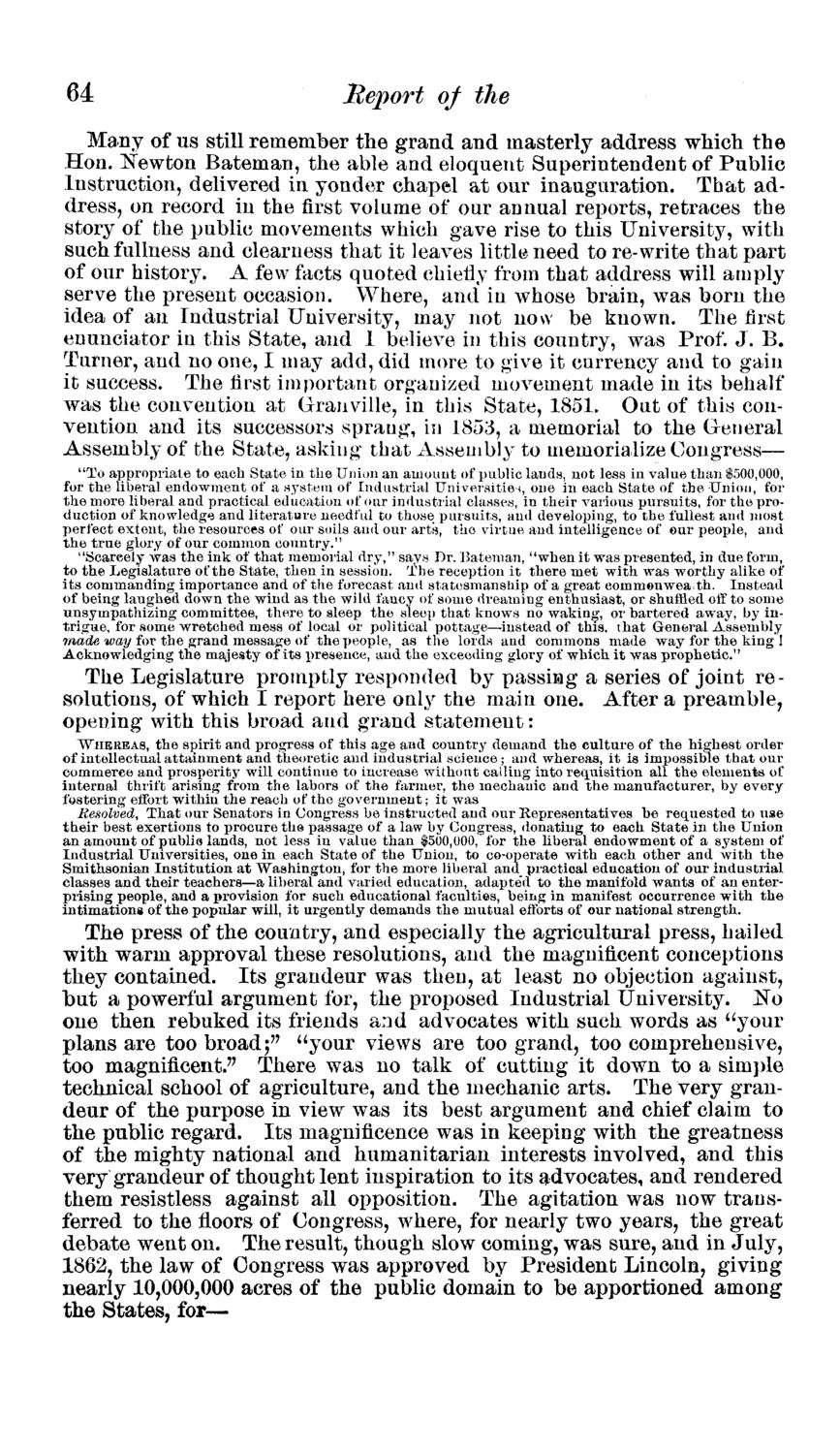| |
| |
Caption: Board of Trustees Minutes - 1874
This is a reduced-resolution page image for fast online browsing.

EXTRACTED TEXT FROM PAGE:
64 Report of the Many of us still remember the grand and masterly address which the Hon. Newton Bateman, the able and eloquent Superintendent of Public Instruction, delivered in yonder chapel at our inauguration. That address, on record in the first volume of our annual reports, retraces the story of the public movements which gave rise to this University, with such fullness and clearness that it leaves little need to re-write that part of our history. A few facts quoted chiefly from that address will amply serve the present occasion. Where, and in whose brain, was born the idea of an Industrial University, may not now be known. The first enunciator in this State, and 1 believe in this country, was Prof. J. B. Turner, and no one, I may add, did more to give it currency and to gain it success. The first important organized movement made in its behalf was the convention at Granville, in this State, 1851. Out of this convention and its successors spraug, in 1853, a memorial to the General Assembly of the State, asking that Assembly to memorialize Congress— "To appropriate to each State in the Union an amount of puhlic lands, not less in value than $500,000, for the liberal endowment of a system of Industrial Universities, one in each State of the Uniou, for the more liberal and practical education of our industrial classes, in their various pursuits, for the production of knowledge and literature needful to those pursuits, and developing, to the fullest and most perfect extent, the resources of our soils and our arts, the virtue and intelligence of our people, and the true glory of our common country." "Scarcely was the ink of that memorial dry," says Dr. Bateman, "when it was presented, in due form, to the Legislature of the State, then in session. The reception it there met with was worthy alike of its commanding importance and of the forecast and statesmanship of a great eommonweath. Instead of being laughed down the wind as the wild fancy of some dreaming enthusiast, or shuffled off to some unsympathizing committee, there to sleep the sleep that knows no waking, or bartered away, by intrigue, for some wretched mess of local or political pottage—instead of this, that General Assembly made way for the grand message of the people, as the lords and commons made way for the king' I Acknowledging the majesty of its presence, and the exceeding glory of which it was prophetic." The Legislature promptly responded by passing a series of joint resolutions, of which I report here only the main one. After a preamble, opening with this broad and grand statement: WHEREAS, the spirit and progress of this age and country demand the culture of the highest order of intellectual attainment and theoretic and industrial science ; and whereas, it is impossible that our commerce and prosperity will continue to increase without calling into requisition all the elements of internal thrift arising from the labors of the farmer, the mechanic and the manufacturer, by every fostering effort within the reach of the government; it was Resolved, That our Senators in Congress be instructed and our Representatives be requested to use their best exertions to procure the passage of a law by Congress, donating to each State in the Union an amount of public lands, not less in value than $500,000, for the liberal endowment of a system of Industrial Universities, one in each State of the Union, to co-operate with each other and with the Smithsonian Institution at Washington, for the more liberal and practical education of our industrial classes and their teachers—a liberal and varied education, adapte'd to the manifold wants of an enterprising people, and a provision for such educational faculties, being in manifest occurrence with the intimations of the popular will, it urgently demands the mutual efforts of our national strength. The press of the country, and especially the agricultural press, hailed with warm approval these resolutions, and the magnificent conceptions they contained. Its grandeur was then, at least no objection against, but a powerful argument for, the proposed Industrial University. No one then rebuked its friends and advocates with such words as "your plans are too broad;" "your views are too grand, too comprehensive, too magnificent." There was no talk of cutting it down to a simple technical school of agriculture, and the mechanic arts. The very grandeur of the purpose in view was its best argument and chief claim to the public regard. Its magnificence was in keeping with the greatness of the mighty national and humanitarian interests involved, and this very grandeur of thought lent inspiration to its advocates, and rendered them resistless against all opposition. The agitation was now transferred to the floors of Congress, where, for nearly two years, the great debate went on. The result, though slow coming, was sure, and in July, 1862, the law of Congress was approved by President Lincoln, giving nearly 10,000,000 acres of the public domain to be apportioned among the States, for—
| |